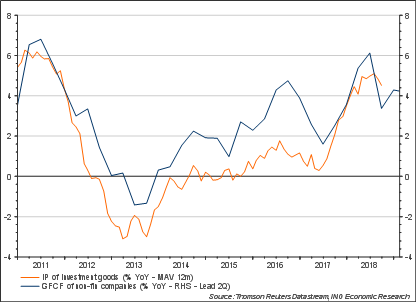France: Industrial production fell in September
Despite a 1.8% fall in September- largely due to the car industry facing temporary headwinds- industrial production rebounded in the third quarter, supported by dynamic investment
Drop in production weakens 3Q18 rebound
French industrial production declined by 1.8% in September. Manufacturing production of consumer durables saw the biggest drop at -6.3% month-on-month- a two-year low, while construction activity rebounded by 3.8%. These figures affected the size of the rebound in industrial production that was expected for 3Q18 and which finally reached 0.7% QoQ after two negative quarters.
These figures provide some insight into the 0.4% QoQ GDP growth rebound estimated for 3Q18. Manufacturing production growth accelerated slightly from 0.2% to 0.5% QoQ in 3Q18, with opposing trends in investments good production (which posted a 1.8% QoQ growth) and in consumer durables (which contracted by 0.5% QoQ after a 2.2% fall QoQ in 2Q18). This mainly reflects the production delays in the car industry due to new emissions standards since the summer. The 1.1% decline in car production in 3Q18 should, therefore, reverse in coming quarters and is not a sign of moribund consumer demand. The manufacturing production figures also show that business investment is still driving domestic demand. And activity in construction seemed to accelerate again after a strong 3.7% QoQ contraction in the first quarter: the good activity figures for September brought 3Q18 growth to 1.9% QoQ after 1.7% QoQ in 2Q18.
Looking at the current level of business investment, it seems that manufacturing production could maintain a positive growth rate on average for the next six months, especially if the car industry rebounds in the coming months. Industrial surveys are showing that despite a decline in the economic outlook, capacity utilisation is not declining significantly while export order books remain full.
Another argument supporting the idea that the blip in consumer durable production is temporary is the fact that private consumption rebounded by 0.5% QoQ in 3Q18 after a 0.1% decline registered in 2Q. If oil prices are still weighing on purchasing power, a positive fiscal impulse is counterbalancing part of it, allowing purchasing power to grow in the second half of the year despite limited gains in the job market. We therefore expect the rebound to be repeated in 4Q18. Overall however, we believe private consumption growth will be limited to 1% this year after 1.2% in 2017. In 2019, with no fiscal headwinds and after the energy price shock has been digested, decreasing unemployment should play its role and allow for more dynamic private consumption growth of 1.5%.

Latest polls continue to show a divided country before European elections
President Emmanuel Macron is still looking for a way to restore his popularity. A WWI memorial tour this week was supposed to help in this regard, but higher energy costs have been working against him. His last approval rating is at 27%, with 44% of French people not trusting him “at all”. These results show how divided France is 18 months after the last election. President Macron still has strong support inside his party but is failing to attract other voters, despite a historically weak opposition both from the right and the left. This does not sound like a good starting point for the European election campaign, which is likely to be dominated by domestic issues. The reform calendar signals a difficult debate (beginning on 9 November) between social partners over unemployment benefit reform. The likelihood of striking an agreement by mid-January, notably on a 1.5 billion structural spending cut, is low, and the government will probably have to omit details of this in the middle of the election campaign, which is likely to make life easier for the extreme right and left on the campaign trail.
Download
Download article"THINK Outside" is a collection of specially commissioned content from third-party sources, such as economic think-tanks and academic institutions, that ING deems reliable and from non-research departments within ING. ING Bank N.V. ("ING") uses these sources to expand the range of opinions you can find on the THINK website. Some of these sources are not the property of or managed by ING, and therefore ING cannot always guarantee the correctness, completeness, actuality and quality of such sources, nor the availability at any given time of the data and information provided, and ING cannot accept any liability in this respect, insofar as this is permissible pursuant to the applicable laws and regulations.
This publication does not necessarily reflect the ING house view. This publication has been prepared solely for information purposes without regard to any particular user's investment objectives, financial situation, or means. The information in the publication is not an investment recommendation and it is not investment, legal or tax advice or an offer or solicitation to purchase or sell any financial instrument. Reasonable care has been taken to ensure that this publication is not untrue or misleading when published, but ING does not represent that it is accurate or complete. ING does not accept any liability for any direct, indirect or consequential loss arising from any use of this publication. Unless otherwise stated, any views, forecasts, or estimates are solely those of the author(s), as of the date of the publication and are subject to change without notice.
The distribution of this publication may be restricted by law or regulation in different jurisdictions and persons into whose possession this publication comes should inform themselves about, and observe, such restrictions.
Copyright and database rights protection exists in this report and it may not be reproduced, distributed or published by any person for any purpose without the prior express consent of ING. All rights are reserved.
ING Bank N.V. is authorised by the Dutch Central Bank and supervised by the European Central Bank (ECB), the Dutch Central Bank (DNB) and the Dutch Authority for the Financial Markets (AFM). ING Bank N.V. is incorporated in the Netherlands (Trade Register no. 33031431 Amsterdam).